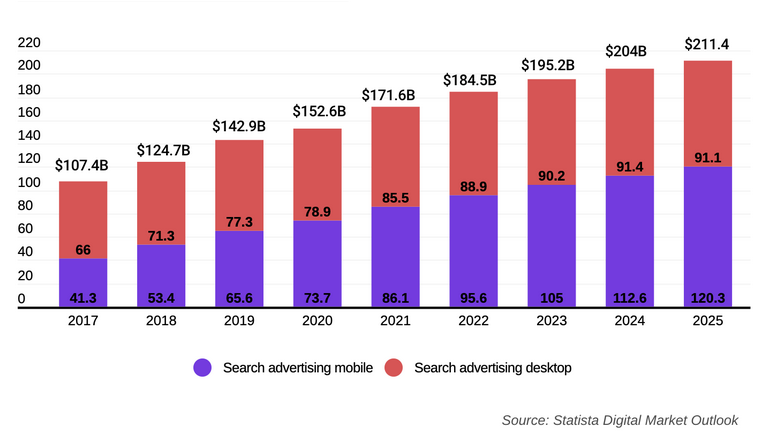The Evolution of Search Advertising →
In a previous post, we saw how internet search evolved from being a generic search application to specialized ones. We also saw how there are also apps that provided bundled search experience but by being a gateway (or gatekeeper) to several specialized search services. With search advertising being one of the most lucrative business to be in, there are large implications from the experience, relevance and the quality of the search results.

The search experience and relevance of search results depends on what one is searching for and what extras go with the main search. Searching for a baseball game in a stadium has more likelihood with pizzas or dining places (to grab a bite on your way to the stadium or dine on way back home), while searching for a baseball game on TV goes well with doordash like home delivery or inviting friends over (via a social app). The geographical aspirations and interests that depend on age also matter a lot. Youngsters are more likely to search for fast-food while the elderly might search for baking needs and recipes. Youngsters might search for camping and youth hostels while others would want to visit museums and other historical sites while staying in hotels closer to the city. Youngsters might search for escape rooms while the elderly might look for concerts and plays. Of course, it is not as black and white as described and it is always a large spectrum of interests, age, location and cultural preferences.
Bundled and unbundled search has huge implications on the search advertising. Instead of advertising in one available avenue (a generic search engine), there are specific applications where one could do targeted advertising. I am very likely to search for a restaurant on Yelp, a movie rating on IMDB, books on Amazon, taxi service on Uber, take-away food on Doordash, etc. What this means is that some of the advertising dollars move away from Google to the specialized search apps. Further the data acquired by these specialized search apps may remain separate making them serve more relevant results and improve search experience. That is one of the reasons one searches for restaurant ratings in Yelp and a doormat’s rating on Amazon. While this might make us assume specialized apps might be the only way to go, all-in-one search apps like WeChat (MiniProgram) act as a gatekeeper to many of the services - in many cases the services can be accessed only through WeChat. This might allow such an app to aggregate user preferences from the different services, profile the interests and allow for cross-selling or upselling dynamic advertisements. Such an aggregation of data from the different services (from within an app) also allows to curate advertisements that would target the specific user’s interests. If he has consistently bought pizza take-out every Friday evening, Uber app could advertise pizza take-away stores on the user’s ride back home on Friday evening, and probably suggest some highly rated movies to watch along with eating his pizza. In the absence of such a nexus between the services, there could be other ways of stitching together the different pieces of information (like payment apps, GPS and mapping data, communication apps, etc.) to build a user profile. News feeds further complicate the search, by being more dynamic and real-time and sensitive to user preferences and interests.
This brings us to the discussion of privacy. How does one use the data in such a way that any individual information is not let out, without affecting the quality of the search results. Lately, privacy is a huge concern among technology companies and has hence renewed interest in the topic. Technologies for ensuring privacy without compromising search quality would be a topic of a future post.